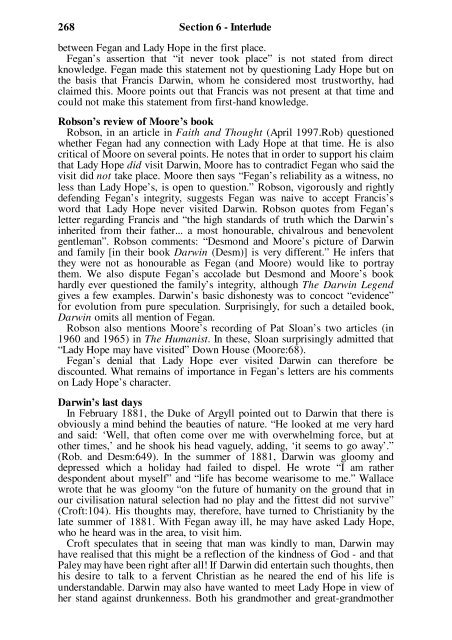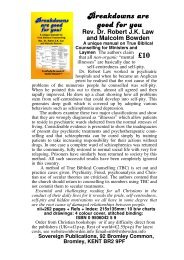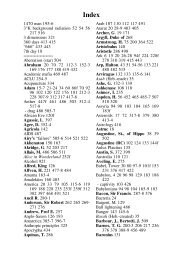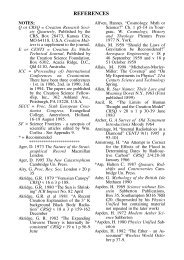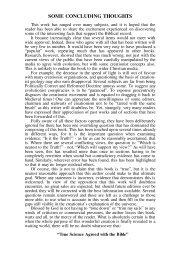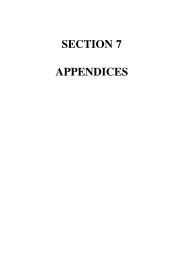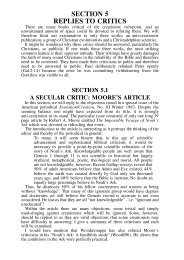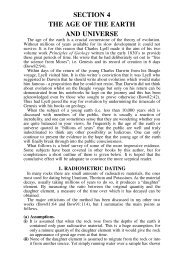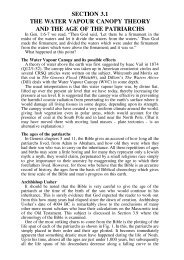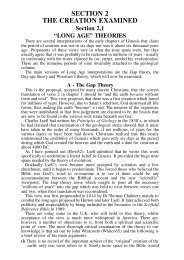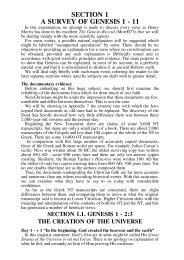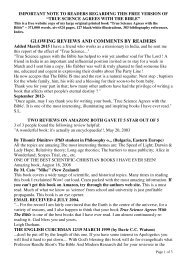TSAWTB Section 6 - Interlude - A Miscellany of Items
True Science Agrees with the Bible, Section 6 - Interlude - A Miscellany of Items (pp. 250-288)
True Science Agrees with the Bible, Section 6 - Interlude - A Miscellany of Items (pp. 250-288)
Create successful ePaper yourself
Turn your PDF publications into a flip-book with our unique Google optimized e-Paper software.
268 <strong>Section</strong> 6 - <strong>Interlude</strong><br />
between Fegan and Lady Hope in the first place.<br />
Fegan’s assertion that “it never took place” is not stated from direct<br />
knowledge. Fegan made this statement not by questioning Lady Hope but on<br />
the basis that Francis Darwin, whom he considered most trustworthy, had<br />
claimed this. Moore points out that Francis was not present at that time and<br />
could not make this statement from first-hand knowledge.<br />
Robson’s review <strong>of</strong> Moore’s book<br />
Robson, in an article in Faith and Thought (April 1997.Rob) questioned<br />
whether Fegan had any connection with Lady Hope at that time. He is also<br />
critical <strong>of</strong> Moore on several points. He notes that in order to support his claim<br />
that Lady Hope did visit Darwin, Moore has to contradict Fegan who said the<br />
visit did not take place. Moore then says “Fegan’s reliability as a witness, no<br />
less than Lady Hope’s, is open to question.” Robson, vigorously and rightly<br />
defending Fegan’s integrity, suggests Fegan was naive to accept Francis’s<br />
word that Lady Hope never visited Darwin. Robson quotes from Fegan’s<br />
letter regarding Francis and “the high standards <strong>of</strong> truth which the Darwin’s<br />
inherited from their father... a most honourable, chivalrous and benevolent<br />
gentleman”. Robson comments: “Desmond and Moore’s picture <strong>of</strong> Darwin<br />
and family [in their book Darwin (Desm)] is very different.” He infers that<br />
they were not as honourable as Fegan (and Moore) would like to portray<br />
them. We also dispute Fegan’s accolade but Desmond and Moore’s book<br />
hardly ever questioned the family’s integrity, although The Darwin Legend<br />
gives a few examples. Darwin’s basic dishonesty was to concoct “evidence”<br />
for evolution from pure speculation. Surprisingly, for such a detailed book,<br />
Darwin omits all mention <strong>of</strong> Fegan.<br />
Robson also mentions Moore’s recording <strong>of</strong> Pat Sloan’s two articles (in<br />
1960 and 1965) in The Humanist. In these, Sloan surprisingly admitted that<br />
“Lady Hope may have visited” Down House (Moore:68).<br />
Fegan’s denial that Lady Hope ever visited Darwin can therefore be<br />
discounted. What remains <strong>of</strong> importance in Fegan’s letters are his comments<br />
on Lady Hope’s character.<br />
Darwin’s last days<br />
In February 1881, the Duke <strong>of</strong> Argyll pointed out to Darwin that there is<br />
obviously a mind behind the beauties <strong>of</strong> nature. “He looked at me very hard<br />
and said: ‘Well, that <strong>of</strong>ten come over me with overwhelming force, but at<br />
other times,’ and he shook his head vaguely, adding, ‘it seems to go away’.”<br />
(Rob. and Desm:649). In the summer <strong>of</strong> 1881, Darwin was gloomy and<br />
depressed which a holiday had failed to dispel. He wrote “I am rather<br />
despondent about myself” and “life has become wearisome to me.” Wallace<br />
wrote that he was gloomy “on the future <strong>of</strong> humanity on the ground that in<br />
our civilisation natural selection had no play and the fittest did not survive”<br />
(Cr<strong>of</strong>t:104). His thoughts may, therefore, have turned to Christianity by the<br />
late summer <strong>of</strong> 1881. With Fegan away ill, he may have asked Lady Hope,<br />
who he heard was in the area, to visit him.<br />
Cr<strong>of</strong>t speculates that in seeing that man was kindly to man, Darwin may<br />
have realised that this might be a reflection <strong>of</strong> the kindness <strong>of</strong> God - and that<br />
Paley may have been right after all! If Darwin did entertain such thoughts, then<br />
his desire to talk to a fervent Christian as he neared the end <strong>of</strong> his life is<br />
understandable. Darwin may also have wanted to meet Lady Hope in view <strong>of</strong><br />
her stand against drunkenness. Both his grandmother and great-grandmother


